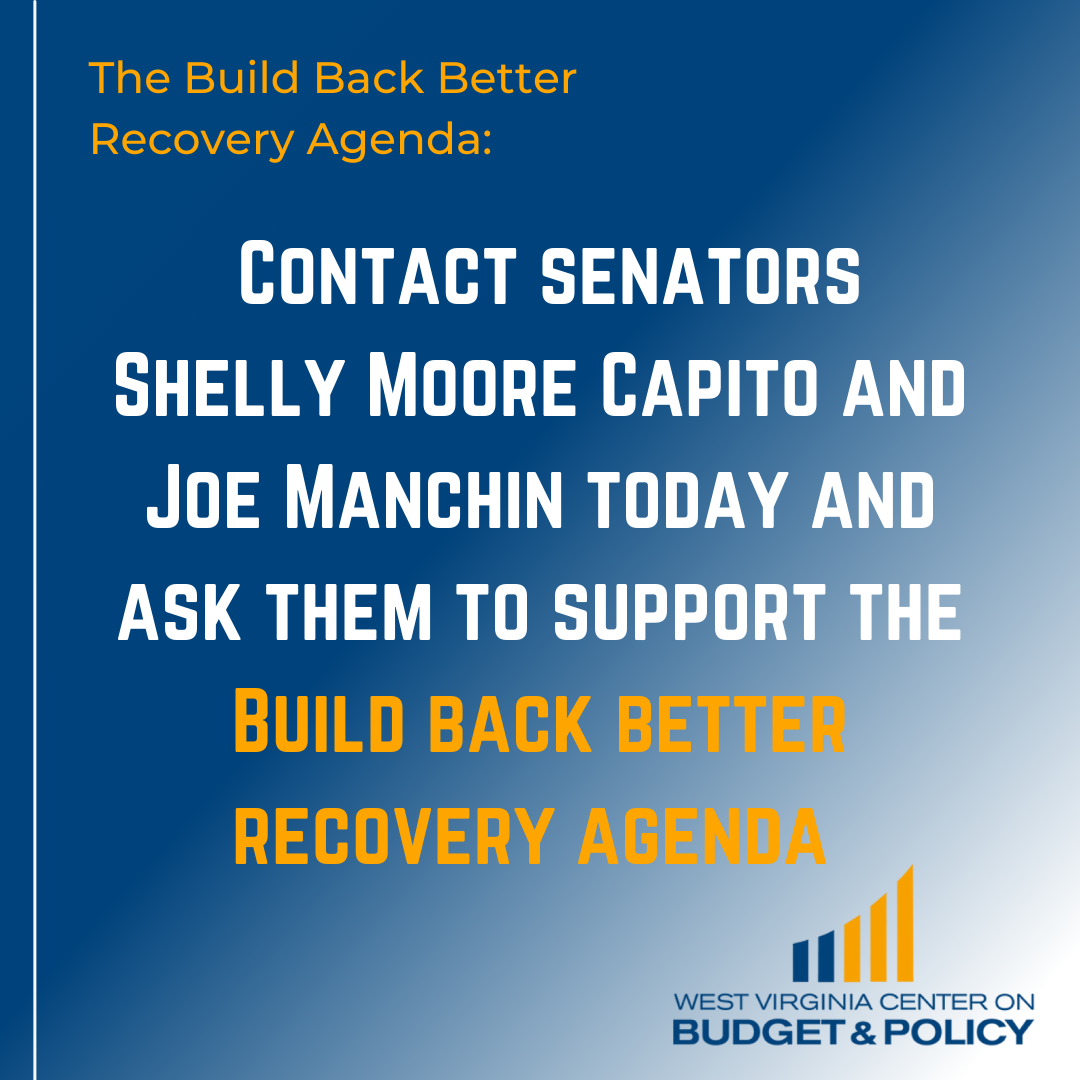While the newest jobs numbers indicate that some areas of West Virginia’s economy are recovering, the job market is far from pre-pandemic levels and employment gains have not been equally distributed. Further, increasing COVID-19 cases remain a threat to workers’ health and the economy.
While the state has seen relatively steady job growth in recent months, recovering 72% of jobs lost in March and April 2020, a substantial jobs gap remains. As of August 2021, West Virginia had nearly 29,000 fewer jobs than before the pandemic.
West Virginia’s unemployment rate spiked from 5.1% in February 2020 to 15.6% in April 2020. Since then, the unemployment rate has fallen back to pre-pandemic levels, and stood at 4.8% in August 2021. However, the state’s labor force has shrunk substantially during the pandemic. A more complete, realistic unemployment rate would take into account those workers who have left and not returned to the labor force. Including those people, West Virginia’s unemployment rate in August 2021 would be 6.6%, still well above its pre-pandemic rate.
The pandemic has highlighted and reinforced the importance of worker protections, good quality jobs, and a strong safety net.
An inclusive pandemic recovery will require targeted investments and policies that support the health and economic security of all West Virginians.
Read Sean’s full blog post here.

West Virginia’s COVID-19 vaccination rate currently lags behind much of the rest of the nation, and the rate varies significantly across the state and within various populations. Understanding the reasons behind these vaccination gaps is critical to protecting public health.
While much of the blame regarding these discrepancies has focused on vaccine hesitancy, it is important to note that researchers have found that lack of accessibility remains the primary driver suppressing vaccination rates nationally – especially for communities of color and rural populations. Access to reliable transportation, internet, and proof of eligibility, as well as flexibility within one’s schedule, represent several barriers that diminish access to the COVID-19 vaccine and health care more broadly.
Without swift, meaningful action that is oriented around relevant, accessible outreach, West Virginia will continue to see elevated COVID-19 outbreaks across the state. Decisionmakers must use data to create robust policies that respond to the needs of their constituents.
Read Rhonda’s full blog post here.
Ready to get vaccinated? Click here to learn more and schedule your appointment. You can also call 1-833-734-0965. The info line is open Monday-Friday from 8 am to 6 pm, and Saturday from 9 am to 5 pm. Thank you for doing your part in keeping West Virginia healthy and safe!

Right now, Congress is considering a budget package that serves as an important companion to the negotiated bipartisan infrastructure package. WVCBP executive director Kelly Allen wrote an op-ed on why it is both logical and critical that the debate of this package focus on the merits and money-saving potential of the bill’s investments, rather than their initial costs. Excerpt below:
Alongside much-needed investments in roads and bridges, it [the budget package] would address longstanding needs of workers and families in our state and around the country — things like paid family and medical leave, to ensure that no worker has to choose between their job and their health; investments in the child care and home health workforces; extension of the child tax credit, which has had immediate anti-poverty and food security effects across our state; and much more.
And yet, instead of talking about the life-changing effects of making the child tax credit permanent, ensuring that home health and child care providers earn a living wage, or of providing paid leave to all workers, much of the public debate so far has focused around a single number: the $3.5 trillion in gross new investments over the next decade that are expected to be included in the package.
But that number fails to focus on the merits of the investments themselves or to take into account that Congress plans to pay for most of that cost through revenue increases and spending reductions as part of the package.
When analyzing the fiscal effects of the proposal, it makes much more sense to focus on the net cost of the package — the amount left after offsetting pay fors — which will be far less than $3.5 trillion. In fact, Moody’s Analytics, a widely respected economic analysis firm, published a macroeconomic analysis in July stating that the infrastructure and budget packages are “more-or-less paid for on a dynamic basis through higher taxes on the well-to-do and a range of other pay fors,” and that inflation concerns are overblown.
Read Kelly’s full op-ed here.

In March of 2021, the American Rescue Plan Act made significant but temporary changes to the Child Tax Credit (CTC). In addition to increasing the value of the CTC and including more families in this critical support, ARPA included the flexibility for eligible families to choose to receive the CTC payments monthly – as opposed to receiving the full benefit after filing taxes.
The first of the advanced Child Tax Credit payments arrived in July, and data is already showing the positive impacts they are having on West Virginia families.
Initial data from the United States Census Bureau’s Household Pulse Survey shows a significant decrease in food insufficiency immediately after households received the first advanced CTC payment. Prior to receipt of the payment, 11.6 percent of West Virginia adults in households with children reported food insufficiency. By the end of July, two weeks after receipt of the first payment, that number had declined to 8.4 percent.
“According to both qualitative and quantitative metrics, the expanded Child Tax Credit is working to reduce hardship and economic insecurity in West Virginia,” states WVCBP executive director Kelly Allen. “As Congress returns to Washington, our representatives have the opportunity to ensure that the benefits of this credit expansion can continue and even grow so that families will have the security of knowing they can consider investing their CTC payments in longer-term needs like college funds and new homes. We urge our federal delegation to prioritize swift passage of a robust Build Back Better recovery package that includes the permanent expansion of the enhanced Child Tax Credit.”
Learn more about how the expanded Child Tax Credit is benefiting West Virginia families in our full statement here and in the article here.

During the 2020 legislative session, the Legislature passed House Bill 2419, which requires magistrates to release people from custody on a personal recognizance bond — as opposed to issuing cash bail — if that person was arrested on certain nonviolent charges. This law was passed in the effort to decrease the state’s jail population. However, the legislation is not currently being implemented in a way that allows it to have its intended impact and reach its fullest potential. A recent article features insight from the WVCBP’s criminal justice policy analyst Quenton King, who testified on the issue during Monday’s Joint Judiciary Committee meeting. Excerpt below:
More people are currently incarcerated in West Virginia’s regional jails than there were in 2020, when the Legislature passed a bail reform law meant to decrease the state’s jail population.
That includes 2,681 people who have not been convicted of a crime.
All of the state’s regional jails were operating well over their intended capacity when the Legislature’s Joint Judiciary Committee met Monday to discuss jail population and potential bail reforms, according to data presented to the committee by Quenton King, criminal justice policy analyst for the West Virginia Center on Budget & Policy, as well as data provided by the Division of Corrections and Rehabilitation.
During Monday’s meeting, 5,390 people were incarcerated in regional jails, according to data provided by the state Department of Homeland Security, which oversees the Division of Corrections and Rehabilitation. On Jan. 29, 2020, the day the House of Delegates passed the bail reform bill, there were 5,100 inmates in the regional jails.
There are 4,265 beds among the 10 regional jails.
King told lawmakers they passed House Bill 2419 with good intentions, but the only time the jail population decreased since the law went into effect in June 2020 was at the onset of the COVID-19 pandemic, when state and county officials worked together to release people from jail to limit exposure and spread of the virus.
Read the full article here.

For too long, the economy hasn’t worked for too many West Virginia families who struggle between finding and keeping work, paying rent and bills, and caring for kids, older relatives, and family members with disabilities. And the COVID-19 pandemic has only made matters worse.
Things can and should be better. Already, benefits such as the expanded Child Tax Credit have proven their ability to help families stay afloat and create jobs in West Virginia. And we now have a golden opportunity in Congress to establish an “infrastructure of care” – one that ensures people have the resources they need to care for their families, keep a roof over their heads, and sustainably return to work.
Join the Coalition on Human Needs and a panel of West Virginia experts (including the WVCBP’s very own Rhonda Rogombé!) on Sep. 22 at 8pm for a free webinar telling you what you need to know about these once-in-a-generation proposals in Congress, how they will help West Virginia families, and what you can do to help.
Register for the webinar here.

This past Tuesday, we dove into the findings of this year’s State of Working West Virginia report on labor, race, and solidarity.
If you couldn’t join us, you can view the recording here and you can access the full report here.

The WVCBP’s Elevating the Medicaid Enrollment Experience (EMEE) Voices Project seeks to collect stories from West Virginians who have struggled to access Medicaid across the state. Being conducted in partnership with West Virginians for Affordable Health Care, EMEE Voices will gather insight to inform which Medicaid barriers are most pertinent to West Virginians, specifically people of color.
Do you have a Medicaid experience to share? We’d appreciate your insight. Just fill out the contact form on this webpage and we’ll reach out to you soon. We look forward to learning from you!
You can watch WVCBP’s health policy analyst Rhonda Rogombé and West Virginians for Affordable Health Care’s Mariah Plante further break down the project and its goals in this FB Live.

Earlier this year, our federal policymakers sent money to families so people can pay their rent and put food on the table, helped school districts protect teachers’ health and get kids back into the classroom, and boosted vaccine distribution—all of which will help accelerate our economy and address the immediate health and economic impacts of the pandemic.
Congress acted because we raised our voices together and demanded help. With short-term relief on the way, now Senator Manchin and Senator Capito need to look to our future and pass economic recovery legislation that ensures everyone can thrive, no matter what we look like or where we come from.
Our elected officials are drafting recovery legislation now, so it’s time to make yourself heard again. Tell them you want our government to support working families and invest in our economic recovery by making health care coverage more available and affordable, permanently expanding relief for struggling people, and ensuring children get the support they need to succeed.
Please join us in urging Senators Manchin and Capito to support the Build Back Better recovery agenda by sending them a letter here.
